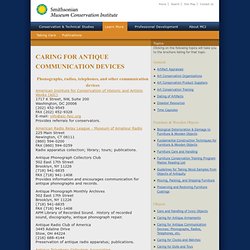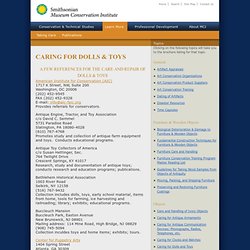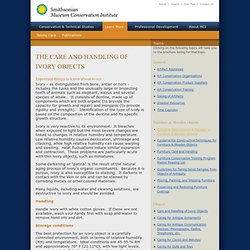

Folding screens.
Antuque Communication Devices. Phonographs, radios, telephones, and other communication devices American Institute for Conservation of Historic and Artistic Works (AIC) 1717 K Street, NW, Suite 200 Washington, DC 20006 (202) 452-9545 FAX (202) 452-9328 E-mail: info@aic-faic.org Provides referrals for conservators.

American Radio Relay League - Museum of Amateur Radio 225 Main Street Newington, CT 06111 (860) 594-0200 FAX (860) 594-0259 Radio apparatus collection; library; tours; publications. Antique Phonograph Collectors Club 502 East 17th Street Brooklyn, NY 11226 (718) 941-6835 FAX (718) 941-1408 Provides information and encourages communication for antique phonographs and records. Antique Phonograph Monthly Archives 502 East 17th Street Brooklyn, NY 11226 (718) 941-6835 FAX (718) 941-1408 APM Library of Recorded Sound. Musical Instruments.
Alabama Music Hall of Fame Highway 72 W, PO Box 709 Tuscumbia, AL 35674 (205) 381-4417 FAX (205) 381-1031 Musical instruments and memorabilia collection; library; educational programs.

Dolls & Toys. American Institute for Conservation (AIC) 1717 K Street, NW, Suite 200 Washington, DC 20006 (202) 452-9545 FAX (202) 452-9328 E-mail: info@aic-faic.org Provides referrals for conservators.

Antique Engine, Tractor, and Toy Association c/o David C. Semmel 5731 Paradise Road Slatington, PA 18080-4028 (610) 767-4768 Promotes study and collection of antique farm equipment and toys. Conducts educational programs. Antique Toy Collectors of America c/o Susan Hettinger, Sec. 764 Twilight Drive Crescent Springs, KY 41017 Research, study and documentation of antique toys; conducts research and education programs; publications.
Bethlehem Historical Association 1003 River Road Selkirk, NY 12158 (518) 767-9432 Collection includes dolls, toys, early school material, items from home, tools for farming, ice harvesting and railroading; library; exhibits; educational programs. CreatabiliToys! Eugene Field House & Toy Museum 634 South Broadway St. International Foundation of Doll Makers PO Box 14438 Ft. Caring for Clocks and Watches. Some references to help in the care of your valued timepieces.

American Clock & Watch Museum, Inc. 100 Maple Street Bristol, CT 06010 (203) 583-6070 FAX (203) 583-1862 Provides lectures, presentations, exhibits, library, and publications. American Institute for Conservation of Historic and Artistic Works (AIC) 1717 K Street, NW, Suite 200 Washington, DC 20006 (202) 452-9545 FAX (202) 452-9328 E-mail: info@aic-faic.org Provides referrals for conservators. American Watch Association PO Box 464 1201 Pennsylvania Avenue, NW Washington, DC 20044 (703) 759-3377 Importers of watches, clocks, and parts; assemblers; domestic manufacturer of watch products; suppliers of goods and services. Antiquarian Horological Society New House, High Street Ticehurst East Sussex TN5 7AL United Kingdom 44-580-220155 Information on timepieces and their preservation.
Bily Clocks Museum PO Box 258 323 South Main Spillville, IA 52168 (563) 562-3569 Provides exhibits, tours and a library. Baldwin, A.M. Antique Armament. Ivory Objects. Important things to know about ivory Ivory - as distinguished from bone, antler or horn - includes the tusks and the unusually large or projecting teeth of animals such as elephant, walrus and several species of whale.

It consists of dentine, made up of components which are both organic (to provide the capacity for growth and repair) and inorganic (to provide rigidity and strength). Identification of the type of ivory is based on the composition of the dentine and its specific growth structure. Ivory is very reactive to its environment. It bleaches when exposed to light but the most severe changes are linked to changes in relative humidity and temperature. Some darkening or "patina" is the result of the natural aging process of ivory's organic constituents. Many liquids, including water and cleaning solutions, are destructive to ivory and should be avoided.
Handling Handle ivory with white cotton gloves. Storage conditions Cleaning and repairing ivory References Gulbeck, Per E. NICCP. Plastics.